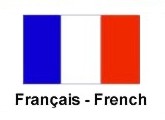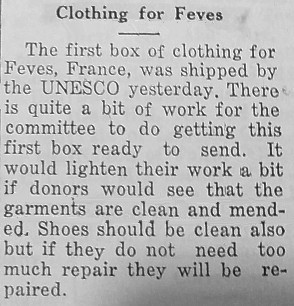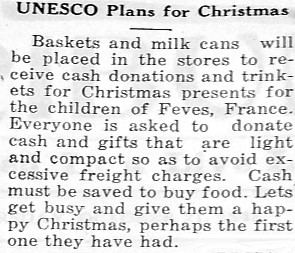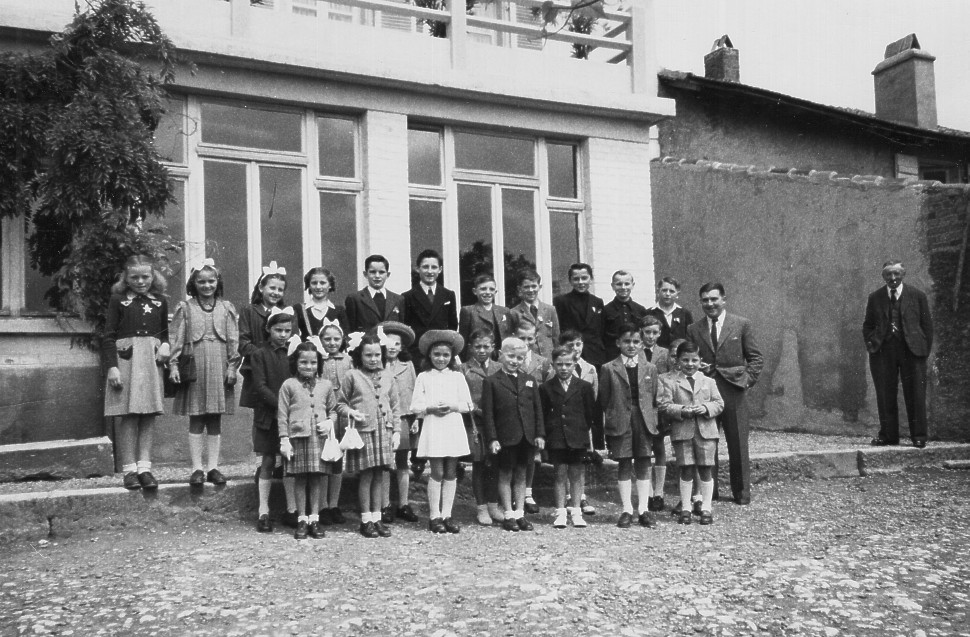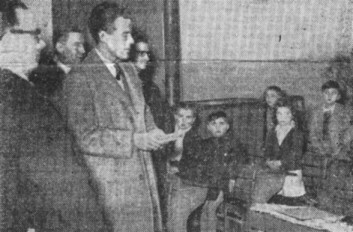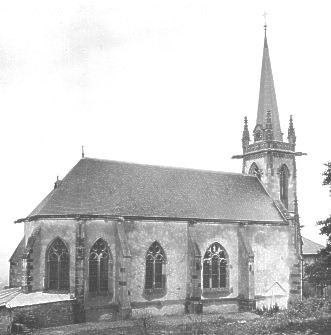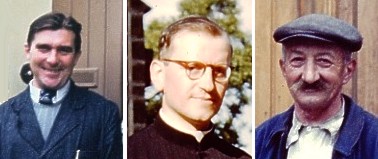It was September 22 when the first shipment of clothing, blankets and shoes left for Fèves from the Rock Island railway
depot in Morganville. The very next day, The Tribune asked for more donations, commenting, "It would lighten their work
a bit if donors would see that the garments are clean and mended."
Near the end of the month, the committee contracted to purchase powdered milk from June Dairy Products Company
of New York.
Todd had suggested that it would be normal for things to move slowly on the Fèves end, but they were moving none too
swiftly on the American side either.
September 23, 1948, Morganville Tribune item
On October 21, the same day Todd sent Carson the letter about Christenson's candy, he sent another much more formal one. A portion of that letter reveals the high regard he had developed for her.
If you have received our latest NEWSLETTER, I am sure you noticed how the Town-to-Town Program is growing. There are
now some one hundred and thirty American communities actively participating and there is good promise that this number
will be greatly increased shortly and during the coming year.
We appreciate that much of the success of this Program is due to your own splendid initiative and the efforts and
co-operation of your Committee.
We would very much like to include your name in our National Advisory Committee. There is no obligation whatsoever
entailed on your part, except that we may, from time to time, call upon you for advice and suggestions based on the
experience you have had in your affiliation with an overseas town. Also, we feel that such concrete evidence of
widespread interest, and a common purpose, gives us added strength in our many dealings with the Department of State,
the relief agencies, and others with whom we are in constant touch.
May we be permitted to use your name on our National Advisory Committee?
Carson accepted Todd's invitation.
In Morganville, the activities in the City Hall building continued throughout the fall with plans to send an additional
shipment of clothing. But thoughts also turned to another sort of shipment. Christmas was coming, so it was decided to
ask neighbors to donate small items that would be light, and so inexpensive to ship, yet could serve as presents for
the children of Fèves.
Empty cans that farmers normally used to haul milk were placed in the businesses of Morganville to receive donations.
The plan was described in a small item in the October 14 Tribune. Unfortunately, this did not prove to be very
successful. The total cash received only added $20 to the treasury. On December 14, the committee sent
the small toys and related items it had collected as Christmas gifts. It was a rather eclectic grouping of items that
included coloring books, a puzzle, a magic slate, 2 rubber balls, a scarf, a kaleidoscope, a cap, balloons, mittens,
stockings, a belt, thumb tacks, a stuffed toy cat, a stuffed toy rabbit, plastic dolls, a top, 7 bars of Camay soap,
work gloves, a whistle, and bracelets.
October 14, 1948 Tribune item concerning Christmas
In the hope these would travel more quickly, they mailed the package to a captain at the military post Caserne Feraudy in
Metz.
While additional materials were being accumulated back in Kansas, more delays occurred in New York. AAtF would repack
items to get as much in a ship as was possible. Then they would wait for a suitable vessel. So Morganville's first
shipment was still in New York when on November 10, the dockworkers went on strike, upset with overtime pay
issues.
Earlier in November, Todd left New York for Europe to visit some of the cities Operation Democracy had paired with
American sisters. The following is the part of that report concerning Morganville and Fèves:
Late one cold afternoon in early December in company with two officials of Entr'Aide Francaise, I drove up the steep and stony road that leads through the plum orchards to Fèves. Along the single winding street, the houses were dark and lifeless, some still showing the effects of American artillery fire. The schoolhouse, as we approached it, was ablaze with light, however, and a delegation waited on the steps to greet us. Once inside, I discovered why the rest of the town was deserted. Everyone in Fèves was at the schoolhouse. Morganville hadn't been forgotten.
The school house in Fèves was actually just part of a building that also served as the Torlotting home and the mayor's office. At the far right is Mayor Auguste Berne. Schoolmaster Henri Torlotting is at the right of the students. The young boy at the far right in the front row is Henri's nephew Gérard Torlotting. His future wife, Solange Parisot, is at the far left in the front row. On December 29, 2013, 64 years after this picture was taken, Gérard and Solange were the first people from Fèves to visit Morganville. Both were aid recipients.
The whole French press was there ... they made speeches. I made a speech in my awful French. When the kids sang "Sur le
Pont," I wept like a baby. I toasted Morganville with glass after glass of Mirabelle - with the Maire [mayor], the
padre [priest], etc. I saw the cows, sat in the 16th century cathedral, had supper in a Lorraine kitchen, gave candy
to every child in Fèves, received dozens of signed photographs for the people of Morganville. There are no illiterate peasants
there. They are good, intelligent farmers, thrilled about Morganville, deeply grateful, endlessly curious, kindly.
After the songs of the school children, speeches by the Mayor and the Cure [priest], and the official presentation
to me as a representative of Morganville, of dozens of letters, photographs and other tokens of Fèves' gratitude, I
went off with the beaming Mayor and the schoolmaster for a quiet talk in the kitchen of the Mayor's damp, unheated
house. There I asked the question which had disturbed me all through those moving ceremonies at the schoolhouse. "Why,"
I asked, "since there is obviously so much gratitude and affection for Morganville here in Fèves, haven't you told them
so?"
The two men were silent for a moment, and I felt perhaps I had been too abrupt. The Schoolmaster was the first to speak.
"We are desolated [sorry] about it," he said in his (for me) difficult French, "but now that we understand, we will do
our part."
The Mayor nodded vigorously and waited for the Schoolmaster to continue.
"Fèves has been deeply touched from the beginning," the Schoolmaster went on. "It is, however, a most difficult and
delicate thing. It is the season of Christmas, you know, and I was afraid my pupils might ask for things. We must never
be beggars here in Fèves."
The Schoolmaster looked up at the Mayor who was following every word and weighing it solemnly.
"As for our Mayor, he is a distinguished man, but he is also a simple farmer, and words to fit such an occasion as this
are most difficult for him to find. One has great fear of being too forward ... America has already done so much. We
read of Morganville's dust storms, their difficult past, of the boys from Morganville who died in the Pacific, and here
in France. They speak with great eloquence of these things. We have, perhaps, not enough eloquence. After today,
however, we will write - for we have a great deal in our hearts to say."
It was a case of shyness and pride. Actually, I had guessed it before they told me, for I had watched the school
children earlier that day as my box of American candy was passed among them. Solemnly, delicately, each had taken one
piece and waited until the last child had been served. Then, with the same sober gesture, they had placed the candy in
their ragged pockets to be eaten later or shared at home. There must be no unseemly haste. It must be done gracefully,
for this was precious. It was from America, and all part of a very important moment. The candy meant friendship - not
charity. And friendship was a solemn thing.
When I returned to the hotel, I couldn't sleep at all, because of the deep responsibility we, and Morganville, had
incurred. They (in Fèves) understood Morganville, and the "Message to Fèves." But, like me, they couldn't quite say
what they felt. It will take time, and very great patience on the part of Morganville. For instance, there is only one
person there who writes English, and he is afraid it will be awkward, that he might say the wrong thing.
A French newspaper article contained a picture of Todd speaking in the school. It included quotes from the message Todd
delivered from the people of Morganville: "We are a farming village. We are not rich, but ... we want to share. ... write
us as if we were cousins, we will listen to you. ... We want you to know that our hearts are moved, and that we wish to
be friends."
Saint Nicholas then distributed about 180 pounds of chocolate.
Todd speaking in the Fèves school
The article refers to Todd as Mr. Thotte. The reporter had asked to make this change. Todd's name, spoken with the
usual European pronunciation, would sound the same as the German word "tod." Tod translates as death and was
associated with the German Totenkopf soldiers who were noted for being particularly brutal. The reporter wanted to
avoid any connection.
In a later interview, Todd added some additional details not included in his more official account of what transpired
during his trip to the little village on the hillside west of the Moselle.
Outside the tiny school, there were many bicycles and many people waiting for me. Inside were the American and French flags and a large sign, "Vive Morganville." ... The schoolmaster said Fèves would always think of Morganville as its own sister across the ocean.
In the town, there was the smell of earth and horses and cows, as at home. We entered a gate to the largest farm in
the neighborhood. The barn was a heap of old hay and rubble, the stone watering trough was smashed, the house shattered.
What remained of the house was mostly kitchen, pots and pans hanging from the walls.
The old fourteenth-century church was built to serve as a fort. ... The young Padre suggested a visit to the
bibliotheque. [library] It turned out to be an ancient cave beneath the church where the town wines were kept.
The Germans had taken most. Some postwar vintages were left. We sampled several, with toasts to Morganville. The people
hid here during the war. Several were dragged out and shot in front of the church.
North face of partially restored Fèves church
About mid-December, Carson received a letter from Todd, who was in Geneva, Switzerland. That letter would serve to introduce the people the Morganville committee would be working with.
I just ran across something in my notes which you should have. Namely, the names of the bright people in Fèves with
whom you should discuss things.
First, there is Henri Torlotting, the school teacher. A young, fine fellow with great understanding. You can talk to
him frankly. Tell him that Todd will never forget the singing of those kids of his.
Second, Louis Holveck, the Curé. A priest, of course, but no Baptist ever need resent it. Also very young and very wise.
Remind him of Todd's trip to the "Bibliotheque" and how much I loved his beautiful old church.
Finally Auguste Berne, Le Maire. He is exactly what a French Mayor should be, but don't count on too much from him
beyond good will. Here again, you can refer to my drinking habits, and assure him that his Mirabelle was the best I
ever had. (I realize my comments are making it impossible to show my letters to fellow Kansans, but one obviously can't
drink French water.)
So Morganville now had the names of the three people who were their committee's partners. Schoolmaster Henri Torlotting,
priest Louis Holveck and Mayor Auguste Berne would handle matters in Fèves.
l-r: Torlotting, Holveck and Berne

